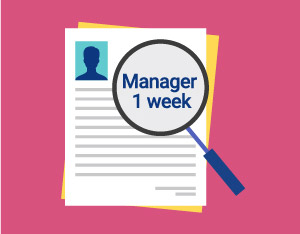Sometimes jobs don’t turn out the way you hoped they would, and you can find yourself questioning whether you should move on to a new role. But this can quickly lead to another question: how long should you be in a job before you include it on your resume?
Eliza Kirkby, Regional Director of Hays, says there’s no set amount of time. “It depends on the circumstances of each job. For instance, if they were temporary roles, say so. Employers understand such assignments are of a short-term nature and are more interested in the skills you used and value you added in these temp jobs than the duration of the assignment.”
And if they were permanent roles? “One or two instances of short tenure is also understandable,” says Kirkby, “since there are times when the reality of working for an organisation is not like you were expecting.” Just be honest and explain why you left, whether that’s because it wasn’t the right culture fit or you craved a different environment.
- How many roles should you include on my resume?
Matt Harrison, Founder and Managing Partner at Hope & Glory Executive, advises including “any role from the last ten years”, to give hirers the full picture of your career. But your most recent roles should be the main focus of your resume.
“Depending on how long you were in each role, this could include your last one, two or three roles,” says Kirkby. “If one of these was a permanent role that you held for just a few months, you should still be as detailed as you can by quantifying your accomplishments during that time.”
- Short-term roles should only be left off your resume if they’re irrelevant
“If they were many years ago or are unrelated to your current career, leave them off,” says Kirkby. “Use the space to instead demonstrate how you’ve added value and gained results in roles that are relevant to the one you’re applying for.”
Harrison adds, “Contract roles you had for less than two months could be left off after 10 years as long as you genuinely believe that their omission is immaterial to the employer's decision-making.” In other words, don’t try to deceive the hirer by “misrepresenting the facts”.
- Be honest about roles you left on bad terms or don’t have references for
Harrison warns against leaving off roles that you left on bad terms. “You need to provide an honest explanation of your departure and show that you’ve moved on and are looking for opportunities that are better suited.”
Put a positive spin on it, says Kirkby. “As always, focus on the results you achieved in the role.”
- Short-term stints are viewed more positively than you’d think
“Most recruiters are probably more pragmatic about short-term stints than some employers, but with the spread of the gig economy, people are more relaxed about short-term stints,” says Harrison. Once again, it’s more about what you did than how long you did it for.
Temporary roles can help – not harm – your resume, says Kirkby, “since people gain exposure to various industries and working practices and hone their skills in such assignments.”
- Build a narrative and present a career objective
“The clearer you make your career timeline in your resume, the easier it will be for hirers to move onto more important questions,” says Harrison. He recommends building a narrative to show how your short-term roles are related. “What are the themes, the big ideas, the common elements that bind your various roles?” For example, do you tend to work for companies that focus on social change, or in roles that all seem to be about helping people?
A career objective can also tie short roles together on your resume, says Kirkby. “Use it to emphasise that you’re looking for a role in an organisation where you can contribute and add value long-term. Quantify the contribution you’ve made in similar previous roles with real-life examples of projects or tasks you successfully worked on.”
If you’re honest, positive and practical about how you present your career history you’re sure to create an eye-catching application.
“Most recruiters are probably more pragmatic about short-term stints than some employers, but with the spread of the gig economy, people are more relaxed about short-term stints,” says Harrison.



